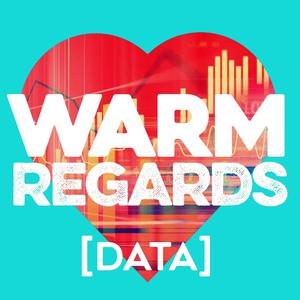Building our Climate Futures Through Storytelling (Part 1), w/Eric Holthaus + Kim Stanley Robinson
In the first episode of our two-part finale of our season on climate data, we’re going to focus on fiction, not facts: specifically, on the world-building, future-crafting writers who tell stories to warn us, teach us, inspire us, and motivate us to work for the future of our choosing. In speaking with authors Eric Holthaus and Kim Stanley Robinson, they discuss how hope, empathy, and, of course, climate science and climate data, informed their most recent work, Eric’s The Future Earth and Kim Stanley Robinson’s The Ministry for the Future.
You can find a link to a full transcript of this episode on our Medium page:
https://ourwarmregards.medium.com/building-our-climate-futures-through-storytelling-part-1-feat-5b2a8077e4b1
You can follow Eric Holthaus on Twitter:
https://twitter.com/EricHolthaus
You can read more about and purchase his book, The Future Earth, here: https://bookshop.org/books/the-future-earth-a-radical-vision-for-what-s-possible-in-the-age-of-warming/9780062883162
Finally, you can subscribe to Eric’s newsletter, The Phoenix, here:
https://thephoenix.substack.com
Kim Stanley (Stan) Robinson:
You can read more about and purchase his book, The Ministry for the Future, here: https://bookshop.org/books/the-ministry-for-the-future/9780316300131
A comprehensive, though unofficial, website dedicated to Stan’s work:
http://www.kimstanleyrobinson.info
On the power of speculative and science fiction:
‘We’ve already survived an apocalypse’: Indigenous writers are changing Sci-Fi: https://www.nytimes.com/2020/08/14/books/indigenous-native-american-sci-fi-horror.html
Afrofuturism, Africanfuturism, and the language of Black speculative literature: https://lareviewofbooks.org/article/afrofuturism-africanfuturism-and-the-language-of-black-speculative-literature/
On climate fiction:
Climate fiction: Can books save the planet? https://www.theatlantic.com/entertainment/archive/2015/08/climate-fiction-margaret-atwood-literature/400112/
The influence of climate fiction: an empirical survey of readers: https://read.dukeupress.edu/environmental-humanities/article/10/2/473/136689/The-Influence-of-Climate-FictionAn-Empirical
The rise of apocalyptic novels: https://www.bbc.com/culture/article/20210108-the-rise-of-apocalyptic-novels
With the world on fire, climate fiction no longer looks like a fantasy: https://grist.org/climate/with-the-world-on-fire-climate-fiction-no-longer-looks-like-fantasy/
Amy Brady’s “Burning Worlds” column for the Chicago Review of Books:
https://chireviewofbooks.com/category/burning-worlds/
On futurology:
Smithsonian will celebrate 175 years with an exhibit about the future: https://www.npr.org/2021/03/01/972409626/smithsonian-will-celebrate-175-years-with-an-exhibit-about-the-future
10 ways science fiction predicted the future: https://www.bbc.co.uk/teach/live-lessons/10-ways-science-fiction-predicted-future/z6dynrd
Please consider becoming a patron on Patreon to help us pay our producer, Justin Schell, our transcriber, Jo Stormer, and our social media coordinator, Katherine Peinhardt, who are all working as volunteers. Your support helps us not only to stay sustainable, but also to grow.
www.patreon.com/warmregards
Find Warm Regards on the web and on social media:
Web: www.WarmRegardsPodcast.com
Twitter: @ourwarmregards
Facebook: www.facebook.com/WarmRegardsPodcast
8 March 2021, 12:33 pm
